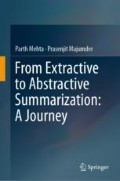Abstract
A standard benchmark collection is essential to the reproducibility of any research. Several initial works in text summarisation suffered due to lack of standard evaluation corpora at that time [1, 8]. The advent of conferences like Document Understanding Conference(DUC) [2] and Text Analysis Conference(TAC) [18] solved that problem. These conferences generated standard evaluation benchmarks for text summarisation and as a result streamlined efforts were made possible. Today such benchmark collections of documents and related manually written summaries, provided by DUC and TAC are by far the most widely used collections for text summarisation. These have become essential for reproducibility as well as comparison of cross-system performance. However, with a lot of data-driven approaches being suggested in last few years the DUC and TAC collection, with their hundreds of article summary pairs, are no longer sufficient. There are a few other corpora like the Gigaword corpus and CNN/Dailymail [21] corpus which have millions of document-summary pairs. But these corpora are not publicly available and hence are of limited use. Moreover both these corpora, and also DUC and TAC, consist only of newswires. However, TAC did later introduced a task on biomedical article summarisation, which we discuss later in this chapter. But overall there are few domain-specific corpora that are both substantially large, to benefit the data-driven approaches, as well as publicly available. In this work we propose two new corpora for domain-specific summarisation in legal and scientific domains. The legal corpus consists of judgements delivered by the Supreme Court of India and their associated summary that are handwritten by legal experts. The corpus of scientific articles consists of research papers from the ACL anthology, which is a publicly available repository of research papers from computational linguistics and related domains. In this chapter we briefly discuss the DUC and TAC corpora as well as the corpora developed as a part of this work. We also provide an overview of the various strategies that are used to evaluate summarisation systems.
Access this chapter
Tax calculation will be finalised at checkout
Purchases are for personal use only
References
Brandow, R., Mitze, K., Rau, L.F.: Automatic condensation of electronic publications by sentence selection. Inf. Process. Manag. 31(5), 675–685 (1995)
Dang, H.T.: Overview of duc 2005. Proc. Doc. Underst. Conf. 2005, 1–12 (2005)
Dang, H.T.: Duc 2005: Evaluation of question-focused summarization systems. In: Proceedings of the Workshop on Task-Focused Summarization and Question Answering, pp. 48–55. Association for Computational Linguistics (2006)
Donaway, R.L., Drummey, K.W., Mather, L.A.: A comparison of rankings produced by summarization evaluation measures. In: Proceedings of the 2000 NAACL-ANLP Workshop on Automatic summarization, pp. 69–78. Association for Computational Linguistics (2000)
Harman, D., Over, P.: The effects of human variation in duc summarization evaluation. Text Summarization Branches Out (2004)
Jaidka, K., Chandrasekaran, M.K., Elizalde, B.F., Jha, R., Jones, C., Kan, M.Y., Khanna, A., Molla-Aliod, D., Radev, D.R., Ronzano, F., et al.: The computational linguistics summarization pilot task. In: Proceedings of the Text Analysis Conference (TAC 2011), Gaithersburg, Maryland, USA (2014)
Jaidka, K., Chandrasekaran, M.K., Rustagi, S., Kan, M.Y.: Overview of the cl-scisumm 2016 shared task. In: Proceedings of the Joint Workshop on Bibliometric-enhanced Information Retrieval and Natural Language Processing for Digital Libraries (BIRNDL), pp. 93–102 (2016)
Kupiec, J., Pedersen, J., Chen, F.: A trainable document summarizer. In: Proceedings of the 18th Annual International ACM SIGIR Conference on Research and Development in Information Retrieval, pp. 68–73. ACM (1995)
Lapata, M., Barzilay, R.: Automatic evaluation of text coherence: models and representations. IJCAI 5, 1085–1090 (2005)
Lin, C.Y.: Summary evaluation environment (2001). https://www.isi.edu/cyl/SEE
Lin, C.Y.: Rouge: a package for automatic evaluation of summaries. In: Text Summarization Branches Out: Proceedings of the ACL-04 Workshop, vol. 8. Association for Computational Linguistics (2004)
Lin, J., Mohammed, S., Sequiera, R., Tan, L., Ghelani, N., Abualsaud, M., McCreadie, R., Milajevs, D., Voorhees, E.M.: Overview of the TREC 2017 real-time summarization track. In: Proceedings of The Twenty-Sixth Text REtrieval Conference, TREC 2017, Gaithersburg, Maryland, USA, 15–17 Nov 2017 (2017). https://trec.nist.gov/pubs/trec26/papers/Overview-RT.pdf
Mehta, P., Majumder, P.: Content based weighted consensus summarization. In: European Conference on Information Retrieval, pp. 787–793. Springer (2018)
Mehta, P., Majumder, P.: Exploiting Local and Global Performance of Candidate Systems for Aggregation of Summarization Techniques (2018). arXiv:1809.02343
Nenkova, A., McKeown, K., et al.: Automatic summarization. Found. Trends® Inf. Retr. 5(2–3), 103–233 (2011)
Nenkova, A., Passonneau, R.: Evaluating content selection in summarization: The pyramid method. In: Proceedings of the Human Language Technology Conference of the North American Chapter of the Association for Computational Linguistics: Hlt-naacl 2004 (2004)
Nenkova, A., Passonneau, R., McKeown, K.: The pyramid method: incorporating human content selection variation in summarization evaluation. ACM Trans. Speech Lang. Process. (TSLP) 4(2), 4 (2007)
Owczarzak, K., Dang, H.T.: Overview of the tac 2011 summarization track: Guided task and aesop task. In: Proceedings of the Text Analysis Conference (TAC 2011), Gaithersburg, Maryland, USA (2011)
Papineni, K., Roukos, S., Ward, T., Zhu, W.J.: Bleu: a method for automatic evaluation of machine translation. In: Proceedings of the 40th Annual Meeting on Association for Computational Linguistics, pp. 311–318. Association for Computational Linguistics (2002)
Rath, G., Resnick, A., Savage, T.: The formation of abstracts by the selection of sentences. Part I. Sentence selection by men and machines. Am. Doc. 12(2), 139–141 (1961)
See, A., Liu, P.J., Manning, C.D.: Get to the point: summarization with pointer-generator networks. In: Proceedings of the 55th Annual Meeting of the Association for Computational Linguistics (Volume 1: Long Papers), vol. 1, pp. 1073–1083 (2017)
Author information
Authors and Affiliations
Corresponding author
Rights and permissions
Copyright information
© 2019 Springer Nature Singapore Pte Ltd.
About this chapter
Cite this chapter
Mehta, P., Majumder, P. (2019). Corpora and Evaluation for Text Summarisation. In: From Extractive to Abstractive Summarization: A Journey. Springer, Singapore. https://doi.org/10.1007/978-981-13-8934-4_3
Download citation
DOI: https://doi.org/10.1007/978-981-13-8934-4_3
Published:
Publisher Name: Springer, Singapore
Print ISBN: 978-981-13-8933-7
Online ISBN: 978-981-13-8934-4
eBook Packages: Computer ScienceComputer Science (R0)

